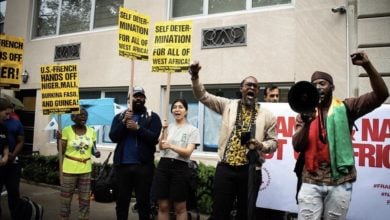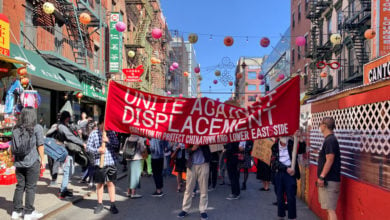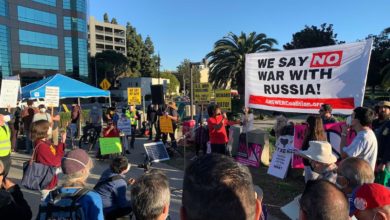 Mara Verheyden-Hillard at an August 2004 press conference in New York City demanding the right to demonstrate in Central Park. Photo: Bill Hackwell |
The Partnership for Civil Justice has filed a number of major lawsuits alleging that the FBI, along with local and state police, initiated a new strategy against mass assembly protests. You claim this new strategy began not after the passage of the Patriot Act in October 2001 but following the 1999 mass anti-globalization protest in Seattle. What are you charging and what have you learned so far through discovery, deposition or research?
In our litigation, we have been making the connection between the local manifestations of police repression that are experienced on the ground and the larger coordinated efforts from a national level, largely led by the FBI. After Sept. 11, 2001, the government has tried to claim that its measures are a protective heightened response to concerns about terrorism. However, the same repressive actions were being carried out well before Sept. 11, 2001, under the Clinton administration, against political activists and political organizations involved in the resurgence of the social justice movement in the U.S.
The term “terrorism” has been employed as a tool against political opponents of U.S. government policy, not based on issues of catastrophic violence but based on viewpoint and ideology. After Sept. 11, 2001, however, the use of the word “terrorism” is also extremely helpful for the funding streams of law enforcement agencies, just as the false “drug war” had been in the past.
What we’ve seen and uncovered is a common scenario of government conduct: joint action between the federal government and local police agencies. Federal law enforcement entities have routinely tried to cloak their participation behind the local police forces, claiming that they are not the primary entity carrying out actions against protesters on the ground because they generally do not make up the uniformed troops who conduct mass custodial arrests, inflict beatings, use weaponry, or conduct other visible physical repression of people engaged in free speech activities.
The federal government-particularly the FBI-is deeply involved in the actions against protesters on a national level that are then carried out on a local basis. Major protests now involve months of planning with multi-jurisdictional agencies as well as fully staffed high-tech joint operational command centers that survey and monitor protesters with the use of visual imaging and undercover operatives. They also then issue strategic directives to officers on the ground against protesters. The simple fact is that local and federal police treat political protest strategically like a military enemy and deploy armed units against them in that framework, acknowledging that lethal conduct is disfavored and tactical disruption of mass assembly and potent protest is preferred.
The actions against protesters and political activists are not limited to “day-of” actions. We see a similar play-book being followed before most major demonstrations. Police demonize protesters, which is dutifully echoed by the press.
This was most recently employed in New York during the Republican National Convention. Tabloids ran weeks of screaming headlines about the dangerous protesters who were coming to town, claiming some of the protesters were akin to “terrorists.” One well-placed front page article came out as the ANSWER Coalition (Act Now to Stop War & End Racism) and the National Council of Arab Americans were in court arguing over the rights of activists to use the Great Lawn of Central Park.
The intention of these articles is two-fold. One is to set up publicly acceptable justification for police repression that ensues during protests. The other is to chill political activity from all those who might be thinking that they support the demands and positions of the protesters by telling people, “Don’t come out, it’s too dangerous.” I have no doubt we will see the same thing again in advance of the mass protests being organized by the ANSWER Coalition for the January 20 inauguration of Bush and Cheney.
Federal and local law enforcement agencies are also engaged in substantial domestic spying against political groups and protesters. The FBI sends out “terrorism” alerts and bulletins that focus on political expression in the U.S. and mass action and employs local police through the national network of Joint Terrorism Task Forces to conduct “intelligence” on political activists.
We are working to expose in discovery the breadth of the federal involvement in these actions, as well as to challenge and stop the disruption tactics that are being employed.
What are some of the specific claims and circumstances of your lawsuits?
Among the constitutional rights cases we are currently litigating are actions related to the April 2000 IMF/World Bank protests in Washington. Law enforcement there conducted a mass arrest and political sweep of nearly 700 people lawfully protesting against the Prison Industrial Complex. They raided and seized the meeting hall and offices of protesters, confiscating their political literature, banners and puppets as well as their medical supplies for the duration of several days of protest while they beat people and drenched them in OC (pepper spray).
There’s the 2000 counter-inaugural demonstration, when the police worked with the private Bush-Cheney Presidential Inaugural Committee to block demonstrators’ access to the parade route, using police lines to disrupt and splinter mass assembly in an attempt to deter and disrupt the mass outpouring against the administration on its first day in office. The Metropolitan Police Department also deployed undercover agent provocateurs who stalked into a crowd of protesters at the parade route just before the motorcade came by and assaulted them with pepper spray. After it was denied for nearly two years, we finally proved that the two men were police officers of the MPD on an “intelligence” detail.
We have another class action political mass arrest in September 2002, when hundreds of peaceful people were herded into and rounded up in a park in Washington, D.C. They were arrested and put into detention overnight, many tied up and hobbled wrist to ankle on a police gym floor, just as had happened to the April 2000 arrestees. There’s litigation from the detention, arrest, and political interrogation of a group of lawful protesters for wearing black-law enforcement deemed them anarchists-at the Washington mass protests in April 2002 against war in Iraq and in support of a free Palestine.
We have another case involving beatings and attacks on a permitted march in April 2003-the first demonstration opposing the occupation of Iraq. The police launched multiple separate attacks on the protesters, using the “rush tactic” to assault the crowd as it marched, beating people with fists and batons, as well as using motorcycles and bicycles as weapons.
We are also part of the National Lawyers Guild Mass Defense Committee legal team litigating the class action, false arrest, and free speech disruption claims from the Miami FTAA demonstrations of November 2003. This was another major National Special Security Event involving federal and local joint action.
 With the increased U.S. war drive, political demonstrations face heavier police surveillance and intimidation. Photo: Bill Hackwell |
The Patriot Act was passed in the days after Sept. 11, 2001, without the usual Congressional discussion, debate or committee processes. It’s a 342-page document especially focused on foreign policy, targeting and silencing groups or persons within the U.S. that may oppose U.S. interventionist policies. It created a new definition of “domestic terrorism” that is so broad as to encompass even nonviolent actions, and could be used against persons using traditional methods of demonstration and civil disobedience.
Many have written and talked about this provision as a new “crime,” which it is not. However, as a definitional measure the government can easily use it as a trigger to open up “terrorism” investigations into political groups in the U.S. and bring into play the many other privacy-invading measures that were approved by Congress and the Senate.
The Patriot Act substantially expanded the authority of the FBI and the CIA to coordinate and conduct domestic spying in the absence of probable cause or suggestion of criminal misconduct. That includes routine monitoring of Internet and e-mail activity, covert searches and seizures of our homes and offices, mass data collection on our personal, financial, educational and medical information and expanded electronic eaves dropping.
When the Patriot Act was passed, the White House and elected officials from both parties played to the fear of the U.S. public. They fostered extreme racism to convince people that the Act was a merited measure targeting non-citizens, primarily the Arab and Muslim community. The hope was that everyone else would be quiet and allow the government to strip the civil rights and liberties away from these communities.
Muslim and Arab communities have suffered mass round-ups, detentions, terrorizing raids on homes and families, the shuttering of charities and seizure of community funds, most frequently without any due process opportunities. The government expected that people would be silent in the face of this vicious assault. What we’ve seen instead is a significant opposition to racist and religious-based attacks on targeted people and groups in the U.S. Significantly, the anti-war movement has made this part and parcel of its political program.
The rejection of nationalist hysteria and demonization and making common cause between groups and people is the single biggest and most effective challenge to the government’s “domestic security” repression.
In addition to the passage of the Patriot Act, are there other actions or executive decrees by the president or attorney general that have been used against the Muslim and Arab communities? Can you explain the meaning of Ashcroft’s adoption of new guidelines in May 2002 that govern the way the FBI and police can conduct themselves in relationship to political and religious activity in the United States?
The White House, Pentagon and Justice Department have instituted many provisions outside of the Patriot Act that are fully contrary to a traditional understanding of civil rights, liberties and the Bill of Rights. Frequently these are enacted by executive order.
They authorized secret military tribunals for summary proceedings and execution of non-citizens who, at Bush’s sole discretion, are deemed “terrorists.” Ashcroft altered regulations that required non-citizens arrested without a warrant and held in custody by the government be charged with some violation in 24-hours. Now, detentions are allowed without any charge for an indefinite period of time. He authorized himself to disregard and override a judge’s order to release non-citizen detainees, even where the judge determined that the detainee was being wrongly held by the government.
They have instituted routine violation of attorney-client communications between certain persons in custody and their counsel, without requiring a court order. The White House and Justice Department attorneys have written memoranda asserting that torture is legally acceptable. It is well known that torture is being carried out against people swept up and detained by the U.S. government in Afghanistan, Iraq, Guantanamo, and in secret “off the books” CIA holding locations around the world.
In the 1970s, the government was forced to acknowledge that it had systematically used law enforcement “counterintelligence” operations in active attempts to destroy the leadership of civil rights, anti-war and other movements. After a public outcry, the famous Senate Church Committee hearings investigated the federal government’s spying operations, including COINTELPRO, Operation CHAOS, and others. The Justice Department put into place certain regulations regarding FBI domestic spying known as the “Levi Guidelines.” This was done because self-regulation is the weakest and least restrictive measure that can be imposed. The FBI would be sure that the FBI behaved well.
The operations against the Latin American solidarity movement in the 1980s, the efforts against environmentalist Judi Bari, and what we have uncovered in our litigation certainly belie the notion that there have been restrictions on domestic spying. But to the extent that there were any limitations, Ashcroft rewrote and lifted the formal restrictions on DOJ guidelines so that people and groups not suspected of illegal activity can be targeted for domestic spying based solely on their political and religious beliefs.
 Photo: Bill Hackwell |
The war against civil liberties at home and the attempts to circumvent the Bill of Rights are the domestic components of an adventurous foreign policy oriented towards long-term global war, conquest, expansion, intervention and occupation. The Bush administration knows that it must protect its global offensive from being undermined by powerful domestic criticism and opposition at home.
The administration has seized and tried to consolidate extraordinary authority under the executive branch seeking secrecy and insulation of those powers. It is part of the imperial orientation of the Bush administration, which claims inherent presidential authority far in excess of that allowed by the U.S. Constitution. The basis for that power, according to the administration and its legal consultants, is that during times of war, the president acts not merely as chief executive but as “commander in chief,” and that he is therefore accorded the widest range possible of unilateral authority in order to deal with exigencies of this new period of constant war-a war that they assert may last our lifetimes.
It is easy to understand under these circumstances why so many feel that we have entered a fascist period. While there are hallmarks of totalitarianism in this conduct, while the White House may dream of imperial rule, and while the repression that many feel is quite real-especially in the Muslim and Arab American communities-I do not believe that we can assert that we have a fascist country.
One need only look at the people’s resistance to this administration and its program to see the opposite. People are still able to take to the streets, the Bill of Rights still stands, even while my organization and others bring legal action to defend people’s rights. There is a huge movement of people in the United States who are building an effective and potent opposition, not just to the particularities of the Bush administration, but in a fight for real social change and for justice.
In the past three years, a time of war and chauvinistic fervor pumped from every newspaper and television, millions of people of conscience in the United States are going against all the best-funded indoctrination and propaganda, and have joined together in collective action. This movement has taken the historic step of linking its fight with the global movement for justice and self-determination.
While there has been a significant level of “mourning” among some progressive sectors after the defeat of John Kerry, there is in that a great failure to see what the current and historical reality of progressive social change is. Few progressives believed that John Kerry represented their interests. Most felt that voting for Kerry was a repudiation of the dangerous Bush agenda, even while Kerry generally supported most of Bush’s agenda with a promise to manage it better. The greatest strides for human rights and justice in the U.S. have been taken not by the politicians, but by concerted efforts of people-in the labor movement of the 1930s, for women’s suffrage and later equal social and economic rights, in the civil rights movement, in the movement to end the war in Vietnam. It is this form of grassroots democracy that can change the political climate and force the most important social and political changes in the United States, and the people of the U.S. retain this immense power.
Recently, hundreds of thousands of people took to the streets in New York City during the meeting of the Republican National Convention in August. The city government refused to grant permits to use the Great Lawn of Central Park, a traditional venue for mass assembly protests. You filed a lawsuit seeking a preliminary injunction against the permit denial for the National Council of Arab Americans (NCA) and the ANSWER Coalition. What was the basis of the lawsuit? Is the litigation continuing?
There’s litigation on behalf of the National Council of Arab Americans and the ANSWER Coalition fighting the effort of New York City Mayor Bloomberg and the wealthy and corporate backers to privatize Central Park, including the Great Lawn, and make it off-limits to mass political assembly, while at the same time allowing corporate-sponsored politically approved events. We brought this litigation originally at the RNC and because of the historic significance of this tactic-removing a public forum from political free speech use, which will have national ramifications-the organizations determined that they wanted to fight this out on behalf of all New Yorkers and really everyone who demands that our parks, sidewalks and streets remain open to political dissent.
Verheyden-Hilliard’s Partnership for Civil Justice can be contacted at http://www.justiceonline.org/






